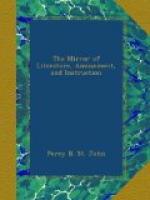* * * * *
THE NATURALIST.
* * * * *
BIRDS CHANGING COLOUR.
In a letter to the Editor of the Literary Gazette.
Sir—Observing in the Literary Gazette of last week, a notice of Mr. Young’s account of the change of colour in the plumage of birds from fear, I have been induced to mention some circumstances which, among others, fell under my own observation, and from which I am led to conclude that such changes among the volatile tribes are not so rare as may be imagined, and are often produced by disease, as well as by other mental passions besides terror.
Without referring to the celebrated Jacobite goldfinch of Miss Cicy Scott, which the good old maiden of Carubber’s Close affirmed became of a deep sable hue on the day of Charles’s martyrdom—though doubtless the natural philosopher would have discovered in this some more efficient cause than respect for the royal sufferer!—I myself recollect a partial change in the colour of a fine green parrot, belonging to Mr. Rutherford, of Ladfield. Like Miss Scott, the laird of Ladfield was a stanch adherent of the house of Stuart, and to his dying day cherished the hope of beholding their restoration to the throne of Britain.
In the meantime, Mr. Rutherford amused his declining years by teaching Charley to whistle “The king shall hae his ain again,” and to gibber “Send the old rogue to Hanover;” for which he was always rewarded by a sugar-plum or a dole of wassail (Scotch short-bread). Those epicurean indulgences at length induced a state of obesity; and so depraved became the appetite of the bird, that, rejecting his natural food, he used to pluck out the feathers from those parts of the back within his reach, and bruise them with his bill, to obtain the oily substance contained in the quills.
The feathers which grew on the denuded parts were whitish, and never resumed their natural hue. I often saw Charley long after the death of his master, and he looked as if Nature, in one of her sportive moods, had created him half parrot, half gosling—so strangely did his whitish back and tail contrast with his scarlet poll and brilliant green neck.




